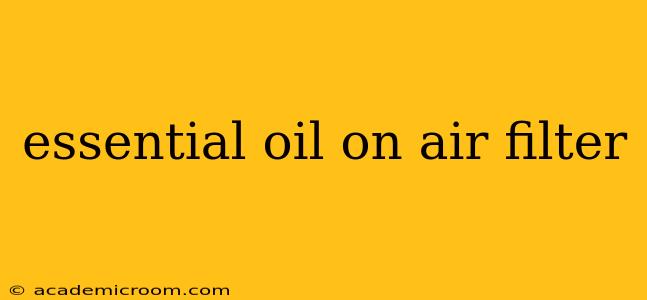The idea of using essential oils in your air filter to freshen the air in your home is appealing. Many essential oils boast pleasant aromas and purported health benefits. However, it's crucial to understand the potential risks and benefits before adding these fragrant oils to your home's air filtration system. This guide will explore the topic thoroughly, addressing common questions and concerns.
Can I Put Essential Oils in My Air Filter?
The short answer is: it depends. While seemingly simple, adding essential oils to your air filter involves several considerations. The type of air filter, the type of essential oil, and the method of application all play a significant role in determining whether it's safe and effective. Using the wrong approach could damage your filter, void warranties, and potentially even create respiratory issues.
What are the Benefits of Using Essential Oils in an Air Filter?
Proponents suggest that adding essential oils to your air filter can lead to several benefits:
- Improved Air Freshness: Essential oils can mask unpleasant odors and leave your home smelling pleasant. This is perhaps the most commonly cited benefit.
- Potential Therapeutic Effects: Some essential oils are believed to possess therapeutic properties, such as lavender for relaxation or eucalyptus for respiratory support. However, the effectiveness of this through an air filter is debated and requires further scientific investigation.
- Natural Alternative: For those seeking a natural alternative to artificial air fresheners, essential oils might seem like a more appealing choice.
What are the Risks of Using Essential Oils in an Air Filter?
Despite the perceived benefits, there are several risks associated with this practice:
- Filter Damage: Essential oils can damage certain types of air filters, clogging pores and reducing their efficiency. This can lead to decreased air quality and a need for more frequent filter replacements.
- Voiding Warranties: Many air filter manufacturers specifically state that adding foreign substances, including essential oils, will void the warranty.
- Respiratory Issues: While some essential oils have purported health benefits, inhaling concentrated amounts can trigger allergic reactions or respiratory problems in sensitive individuals. This is especially true for those with asthma or other breathing difficulties.
- Ineffective Purification: Essential oils do not purify the air in the same way a HEPA filter does. They mask odors, but they don't remove pollutants, allergens, or bacteria.
What Types of Air Filters are Suitable for Essential Oils?
Generally, no air filter is truly designed for essential oil use. While some individuals may try diffusing oils near the filter, direct application is strongly discouraged. HEPA filters, in particular, are very sensitive and easily damaged. Using essential oils in them could significantly reduce their effectiveness and lifespan.
How Can I Safely Use Essential Oils to Freshen My Home's Air?
Instead of adding essential oils directly to your air filter, consider safer and more effective alternatives:
- Diffusers: Essential oil diffusers are designed to disperse oils safely and effectively into the air. They come in various types, including ultrasonic, nebulizing, and heat diffusers.
- Room Sprays: Homemade or commercially available room sprays provide a convenient way to freshen the air without risking damage to your air filter.
Which Essential Oils are Best for Air Purification (via Diffusers, Not Filters)?
While essential oils don't purify air in the traditional sense, certain oils are known for their pleasant aromas and potential antimicrobial properties when diffused:
- Tea Tree Oil: Known for its antimicrobial and antifungal properties.
- Lemon Oil: A refreshing scent with cleansing properties.
- Lavender Oil: A calming scent often used to promote relaxation.
- Eucalyptus Oil: Often used to clear respiratory passages, but use cautiously if you have sensitivities.
Remember always to dilute essential oils properly before diffusing them and to discontinue use if you experience any adverse reactions.
Ultimately, using essential oils to improve indoor air quality is a nuanced topic. While the aroma may be appealing, the potential risks to your air filter and respiratory health outweigh the benefits. Instead of compromising the performance of your air filtration system, opt for safer alternatives like diffusers or room sprays to enjoy the pleasant scents of essential oils. Always prioritize the health and safety of yourself and your family.
